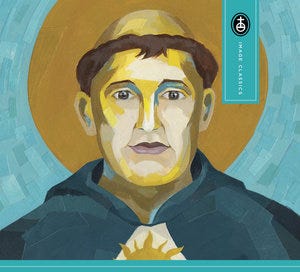[Book Review] St. Thomas Aquinas
A brief introduction to the work and history of St. Thomas Acquinas by G.K. Chesterton
Thomas Aquinas (1225–1274), was a Dominican philosopher in Italia. He was a theologian and friar that lived from 1225 to 1274. That period of history is fascinating to observe in retrospect. In relation to the modern era it has almost none. That era of history is markedly divorced from our own, yet has similar struggles in interpreting reality and theology. The book on Saint Thomas of Aquinas, written by G.K. Chesterton was written as an introduction to the character and a brief overview of his extensive philosophical works.
Chesterton's introduction, written in 1933, an auspicious time period. This context adds depth to the book in two ways. First, it reveals the assumptions held by philosophers of Chesterton's time: concepts such as inherent ethnic identity, which sharply contrast with modern notions of egalitarianism. It is striking to read a work that casually refers to Mussolini as a contemporary with a "big Italian head."
Second, the text offers insights into Saint Thomas Aquinas' life and his era, a time when Christianity was divided in its orthodox interpretations. The split lay between dualistic Manichaeism and the more traditional Augustinian philosophy.
Manichaeism posits a dualistic theology in which spiritual truth exists separately from material truth. In contrast, Augustinian orthodoxy, championed by Aquinas, asserts that truth is singular and can be approached either through inner spiritual enlightenment or external understanding of the material world. For Aquinas, truth is unified, not a dualistic phenomenon divided between man and nature. He advanced these ideas through extensive writing and correspondence, leaving an enduring legacy in the history of theology and philosophy.
Thomas Aquinas developed as a basis for his Thomist (tō-ˌmi-zəm) philosiphy an idea best expressed by the Latin word “-ent” or “ents” to mean “that which is.” Contrary to many modern philosophical thinkers Natchez, Hagel, Plato etc., Thomas Aquinas believed things to exist as they are. Reality is not a reflection of a perfect realm of forms, reality does not exist in the “act of becoming.” A simple description is sufficient, but really rankles air-headed overly analytical philosophers:
That which is, exists… things exist as they are.
While simple in concept, as the basis for theology, this acceptance of the physical world as being itself represents a fundamental break from more traditional philosophical routes to truth. It requires an assumption that the human mind and spirit really do exist in the form we know them. It also assumes that the human mind to recognize and understand its surroundings mostly accurately.
Thomist theological philosophy provides a level of spiritual grounding that many other philosophies lack. A kind of spiritual "everyman" perspective that forms the baseline of the human experience.
For Saint Thomas Aquinas, the mind is not illuminated by a divine spirit within but by reality outside of us. Even as children, before we understand objects in an abstract or conceptual sense, we can still recognize the dirt, trees, and grass we see through a window. We don’t need to touch or overanalyze them to know they are real. We aren’t perceiving hazy shapes of green and brown; we’re seeing trees and grass, even if, as children, we don’t yet have names for them.
While my own ideas build on some of the work from Thomist philosophy, I do think that it’s an intellectual exercise fundamentally different from what we’re accustomed to. The world we live in now is filled with abstractions from net wealth to cultural relativism. In many ways our world reflects a Manichae position. Cultural relativism is a distant cousin of the idea that there are multiple paths that lead to different Truths.
What the world needs now is a more grounded understanding of reality; one that rejects the high-brown “intellectual” facades of academia and begins from a simple premise. There is truth. There may be many paths to truth, but there is only one… and as such, what we observe as existing in reality exists. No special interpretation; an acceptance that which is… is. -Ent.
While this book is more fun than a dry philosophical tome, it also contains only an introduction to the work of Saint Thomas Aquinas. I would recommend this book to those interested in history, both modern history (1933) and the early history of the Faustian West. The 1200s were the era of legends for western civilization, legends told and retold and rewritten. Our ancient histories were contemporary to the subject of this text, and that alone is fascinating. A distant past where truth and myth merge in the telling makes for a fascinating adventure into our own history.
In many ways, a fascinating adventure into our present.
Besides, the text itself is relatively short at 144 pages.





Thank you for sharing this introduction to St. Thomas Aquinas. I have been looking at Summa Theologiae, it is rather weighty, so perhaps something that will ease me into reading it will be helpful. I have been meaning to look at Chesterton for a while anyway.
On your reflection on Thomism, I agree completely. In the pursuit of the hyperrealism of the digital world and the constant game of symbols and meanings, to see the world for what it is, no more or less, we gain invaluable perspective. Where ends and goals are disguised behind optics of media, looking at the world in the light of day we see the injury done to us as we neglect the real here and now and let others dictate our physical lives.